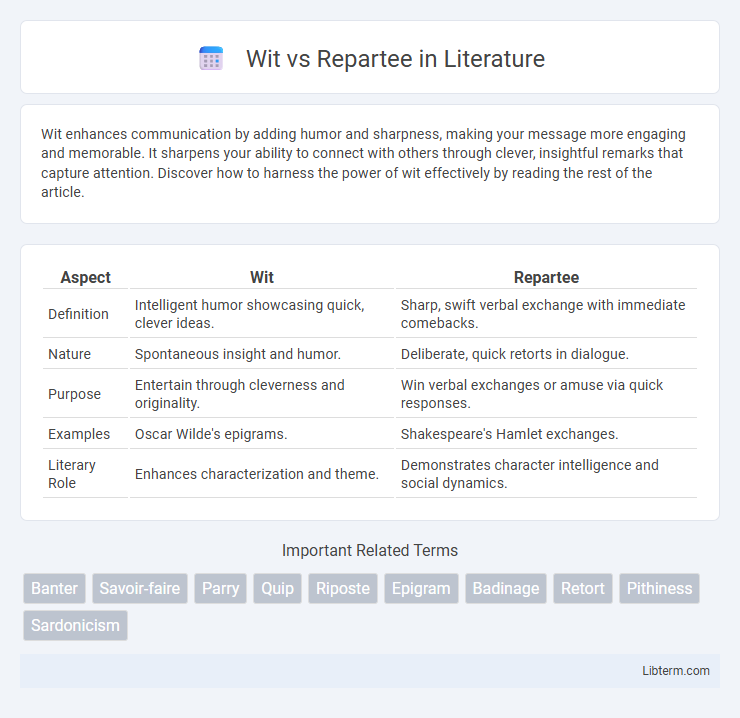Wit enhances communication by adding humor and sharpness, making your message more engaging and memorable. It sharpens your ability to connect with others through clever, insightful remarks that capture attention. Discover how to harness the power of wit effectively by reading the rest of the article.
Table of Comparison
| Aspect | Wit | Repartee |
|---|---|---|
| Definition | Intelligent humor showcasing quick, clever ideas. | Sharp, swift verbal exchange with immediate comebacks. |
| Nature | Spontaneous insight and humor. | Deliberate, quick retorts in dialogue. |
| Purpose | Entertain through cleverness and originality. | Win verbal exchanges or amuse via quick responses. |
| Examples | Oscar Wilde's epigrams. | Shakespeare's Hamlet exchanges. |
| Literary Role | Enhances characterization and theme. | Demonstrates character intelligence and social dynamics. |
Understanding Wit: Definition and Origins
Wit is the ability to express thoughts quickly and cleverly, often involving wordplay or sharp insights that reveal intelligence and creativity. Originating from the Old English term "witt," meaning understanding or knowledge, wit has evolved to signify mental agility and a keen sense of humor. In literature and conversation, wit serves as a reflection of cognitive flexibility and social awareness, distinguishing it from repartee, which specifically refers to quick, witty replies.
The Art of Repartee: A Quick Overview
Repartee is the art of delivering swift, clever, and often humorous responses in conversation, emphasizing spontaneity and wit. Unlike general wit, which encompasses a broad range of cleverness including jokes and puns, repartee specifically highlights quick thinking and verbal agility in dialogue. Mastering repartee requires sharp mental acuity and the ability to read social cues instantly to craft timely and impactful remarks.
Key Differences Between Wit and Repartee
Wit involves quick, inventive humor that often relies on clever language and intellectual insight, while repartee specifically refers to sharp, quick exchanges in conversation or dialogue. Wit can be an individual expression of humor, crafted through deep mental agility, whereas repartee is explicitly interactive, emphasizing the back-and-forth nature of verbal sparring. The key difference lies in wit's broader application as a mental sharpness and repartee's precise role in rapid, spontaneous verbal exchanges.
Famous Examples of Wit in History
Wit is exemplified by figures like Oscar Wilde, whose sharp and clever remarks, such as "I can resist everything except temptation," showcase intellectual humor with elegance. Benjamin Franklin's witty aphorisms, including "An investment in knowledge pays the best interest," reveal insight paired with brevity. These examples highlight how wit combines intelligence and humor to create memorable, thought-provoking statements.
Celebrated Masters of Repartee
Celebrated masters of repartee, such as Oscar Wilde and Dorothy Parker, exemplify quick-thinking dialogue that blends sharp humor with cultural insight, often disarming opponents with elegant yet pointed remarks. Their repartee showcases versatility in language play and social intelligence, emphasizing spontaneity over premeditation, a hallmark that distinguishes repartee from wit's broader intellectual agility. The legacy of these figures endures in literature and popular culture, cementing repartee as an art form integral to sophisticated verbal exchanges.
Wit vs Repartee in Everyday Conversation
Wit in everyday conversation involves quick, clever insights that capture humor and intelligence succinctly, often highlighting an unexpected perspective. Repartee emphasizes rapid-fire exchanges where sharp, humorous responses keep the dialogue lively and engaging. Both enhance social interactions, but wit tends to be more spontaneous and reflective, while repartee thrives on interactive, playful banter.
Psychological Impact: Wit vs Repartee
Wit stimulates cognitive engagement by encouraging quick mental associations and creative thinking, enhancing problem-solving skills and boosting confidence. Repartee, characterized by rapid, sharp exchanges, fosters social bonding and assertiveness, reducing social anxiety through effective communication. Both wit and repartee positively impact psychological well-being by promoting mental agility and reinforcing social connections.
Role of Timing in Wit and Repartee
Wit relies on quick, spontaneous responses to highlight intelligence and creativity in conversation, with timing critical to delivering punchlines that maximize impact. Repartee involves a rapid exchange of clever remarks, where timing ensures each retort builds on the previous one to maintain a lively, engaging dialogue. Mastery of timing in both wit and repartee enhances humor effectiveness and keeps the interaction dynamic and memorable.
Developing Your Own Wit and Repartee Skills
Developing your own wit and repartee skills involves honing quick thinking and sharp expression to engage others effectively. Practicing improvisational exercises, expanding your vocabulary, and observing clever conversationalists enhance your ability to respond promptly and cleverly. Regularly engaging in social interactions with the intent to amuse and inform boosts confidence, enabling spontaneous and memorable verbal exchanges.
When to Use Wit or Repartee: Social Strategies
Wit is ideal for thoughtful, clever remarks that require reflection and showcase intelligence, often suited for formal or intellectual social settings. Repartee thrives in fast-paced conversations, enabling quick, sharp comebacks that enhance social bonding and display verbal agility among friends or casual gatherings. Employing wit or repartee strategically depends on the social context, audience, and desired impact, balancing sophistication with spontaneity.
Wit Infographic

 libterm.com
libterm.com